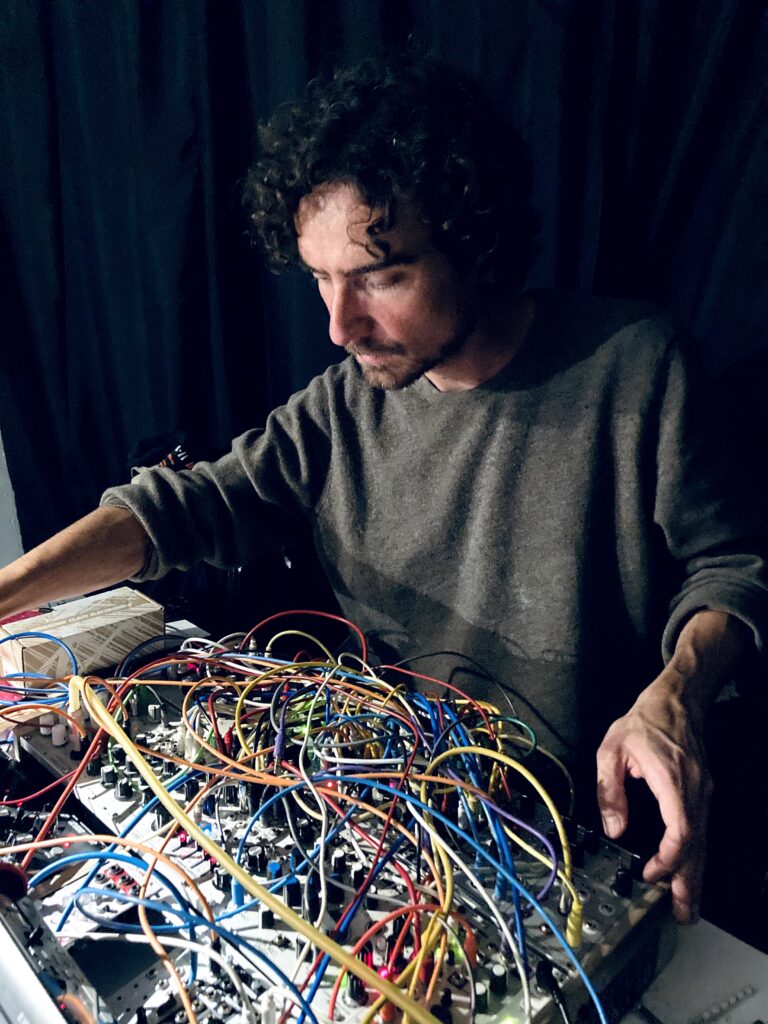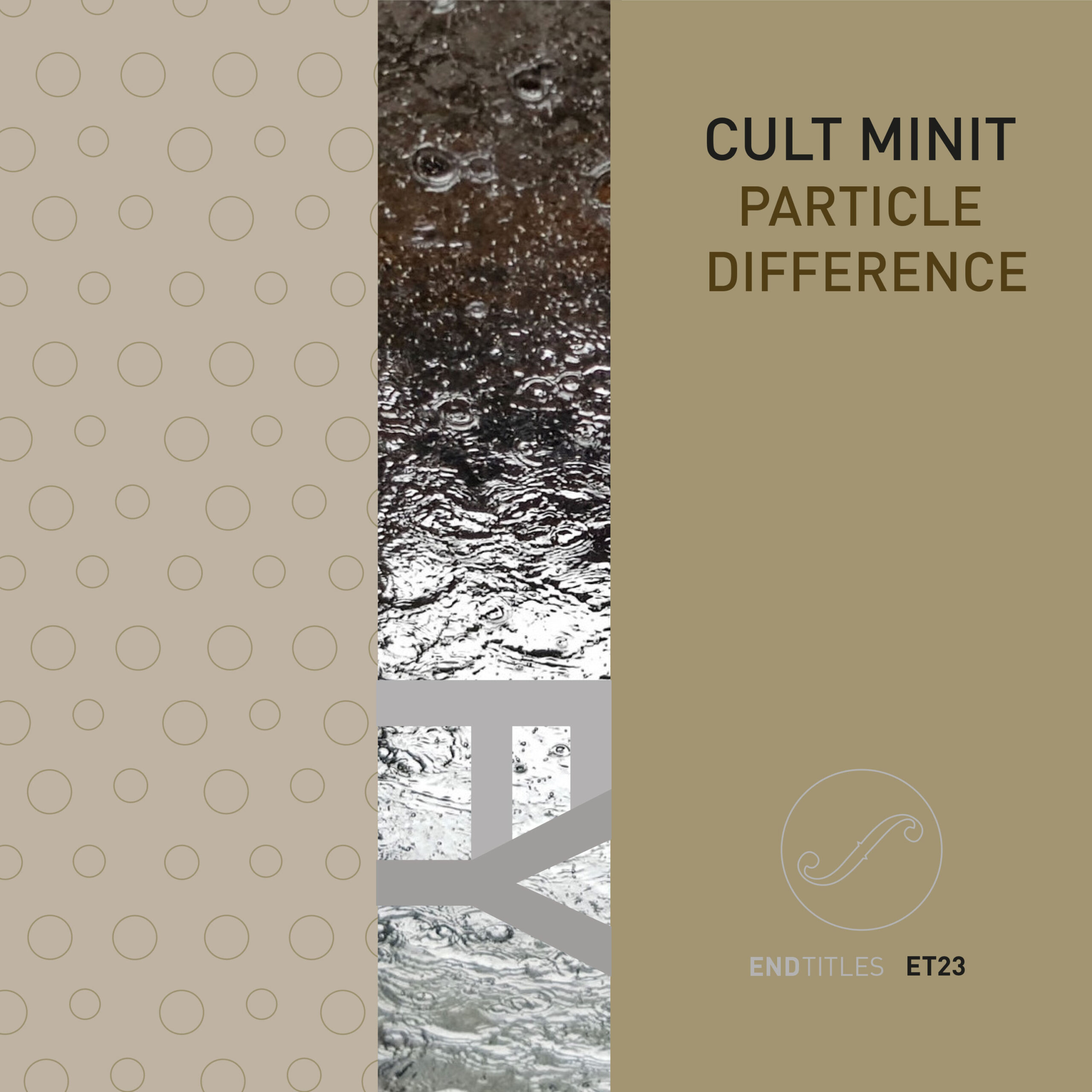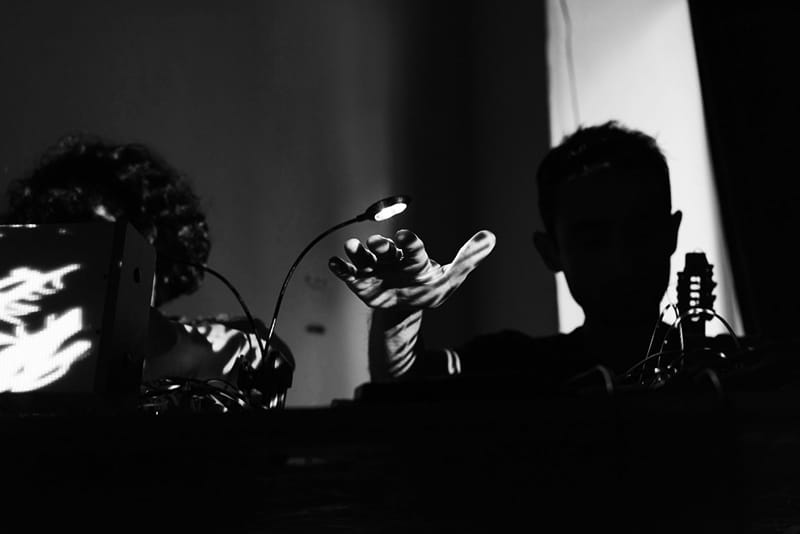Feyz

Cult Minit: Particle Difference

Feyz is back! Cult Minit evolved from various shows in Zurich 2017/18 particularly through the silent film Marathons of IOIC. In 2018 Buchanan moved to Zurich which quickened the evolution of their sound; they began regular practice and with several gigs developed a particular voice. The base of the music are the Modular landscapes created by Emre Sarigöl, swirling twisting clouds of diverse frequencies driven by pulsing yet pleasantly random sequences of rhythm. These present a strong foundation on which Steve Buchanan layers his more «conventional» instruments sax, guitar etc in very unconventional ways…
Album of the week by Modular Station: modular-station.com/particle-difference-by-cult-minit-feyz-steve-buchanan-paed-conca/
Meeting the artist. An Interview.
ET: What is your new album «Particle Difference» about?
CM: «Particle Difference» is above all a reflective expression of the time it was created in .. A time of disillusion, isolation, frustration, a socially null time for the most part. And that’s the drive behind it, the positive side being that all that time allowed us to reflect on these shared questions which developed into sound and a kind of «style».
ET: What was your instrumental approach for the album?
CM: This had to do with several choices. One is that of the actual physical instruments. For example Steve is both a guitarist and saxophonist. As a guitarist he plays three different types of guitar; e-guitar, classical and tenor guitar. Which to use? Which fits? Emre as well plays bass and kopuz as well as modular. In the end the maininstrumental choice was how to work orchestrally, creating contrast and variety and avoiding the trap of endless soloing. We were already evolving this as a duo when Paed came in. Then of course began many sort of «horn section» passages, many microtional in character. These blend beautifully with modular.
ET: What are your main music related influences?
CM: Ha-ha, an extremely large discourse as we all come from different musical backgrounds! Steve’s influences run anywhere from sun-ra, afro-cuban music, hard techno, contemporary music etc. Paed is anywhere from husker-du to shahaabi, to contemporary. Emre is from turkish classical and experimental electronics, etc etc etc. What we all try to do though is catalyse those elements into new ones.
ET: Tell us more about your work? How or/and where did you guys met?
CM: Cult Minit evolved from the encounters of Steve Buchanan and Emre Sarigöl during various shows in Zurich 2017/18. In 2018 Steve Buchanan moved to Zurich, which prepared the ground to form a duo collaboration; they began regular practice and with several gigs developed a particular voice. The base of the music are the Modular landscapes created by Emre Sarigöl, swirling twisting clouds of diverse frequencies driven by pulsing yet pleasantly random sequences of rhythm. These present a strong foundation on which Steve Buchanan layers his more «conventional» instruments sax, guitar etc in very unconventional ways. On this first official release, they are joined by clarinetist and composer Paed Conca. Steve and Paed have been playing together since well over a decade as «Buswhac». Bushwac was on a Swiss tour during March 2019 when the outbreak happened. Paed was stranded in Zürich after their last show before lock-down, and cancelled his plans to return to Beirut, where he is based since a long time. From this point, Steve, Paed and Emre started meeting regularly to play music throughout the next few months. Paed’s presence especially in terms of form and structure made the the sessions go far towards making this a memorable musical journey.
ET: Will there be more of your collaboration?
CM: Paed is based in Beirut, and therefore a future collaboration in this trio format is not planned and would only happen per chance, as was the case in the making of «Particle Difference». That being said, Cult Minit itself will exist and keep making music, and it seems like it will always be open to collaborations with brilliant musicians such as Paed …
ET: Thank you guys! Cheers!
FezayaFirar & Luiz Rocha: BORDERLINE

The album “Borderline” is the live improvised session of clarinet player Luiz Rocha and the experimental electronic duo FezayaFirar for the silent movie with the same name during “Marathon der Liebe” Silent Film Festival 2016 in Zürich, Switzerland
This is the spontenaous and succinct response of the musicians to the UK/Swiss production silent film from 1930 “Borderline” by Kenneth Macpherson, where the core theme of the film builds around forbidden interracial relationships leading to racial stigma. Conflicts, despair. This broken plot together with the deep and detailed sound world created at two o’clock in the night has invited the ghosts of former mistakes to the room.
Luiz Rocha is a Brazilian clarinet and bass clarinet player based in Barcelona. He produces works mostly in free improvisation, new music and contemporary genres and takes part in various avant-garde infused ensembles and collaborations. He is a close collaborator with Discordian Records. EndTitles released an album with Luiz back in 2015.
Meeting the artist. An Interview.
ET: What is your new album «Borderline» about? What was your instrumental approach for the album?
F: Borderline takes its title from the UK/Swiss film with the same title produced by Kenneth Macpherson in 1930. The tracks are excerpts from a concert we played alongside the film which was shown at the Stummfilm-Festival in Zürich. Stummfilm- Festival is probably my favorite festival in Zürich. Each year the films are chosen according to that yearʼs concept, and in our case the festivalʼs theme was love. However our film was not a romantic love story at all. On the contrary, Borderline builds around a forbidden interracial relationship and the tragedies it entails. Therefore the film was very central to the albumʼs concept. We performed as a collaboration project between Fezayafirar ( Melih Sarigöl on electronics & DIY percussive strings & field recordings, myself on modular electronics & e-bass ) and Luiz Rocha on clarinets. It is probably the album with the largest presence of acoustic instruments we have produced so far. The main idea was to setup the electronics, in particular the modular synth, as a sound generating basis to respond and improvise with the instruments. So all of the instruments used (clarinets, e-bass and strings) were connected in different ways to the synth and other electronic components, not only for processing their audio signals but rather to generate signals like gate and trigger, which were themselves processed live in different ways ( mainly wave shaping and clock processing ) to trigger various functions in the system. We set it up so that everyone could activate their instrumentsʼ signal paths as they liked using expression pedals. Like that, as we played we could mix in these sounds live with the raw instrumental sounds as well as sounds coming from other oscillators.
ET: Tell us more about your cooperation with Luiz Rocha and your show at the Stummfilm-Festival?
F: In the Fall of 2016, Melih and I joined the Multiversal festivals in Barcelona and Marseilles. Mutliversal is a constant series of non-profit events born in Berlin and based in Europe with the objective of facilitating encounters among musicians in different mostly independent spaces around Europe. Already in the first evening of the tour, I shared the stage with Luiz and we really liked what we played and also each other, and the next day we found a studio space in Barcelona to play a while more together. The Stummfilm-Festival was bound to happen in three weeks, where we as Fezayafirar were planned to perform with the film already. So we decided to invite Luiz as well, because we were really liking the music we played together in these two days in Barcelona. And that is how Luiz came to Zürich in three weeks time to play together at 2am in the morning to this dark film … Pablo and Martin from IOIC – the organizers of the festival – were very receptive to the idea to add Luiz to the line-up for the festival. So that probably adds to the spontaneous flavour of the entire album. Surely Pablo and Martin deserve a big thanks for letting this happen. After the festival, we continued collaborating with Luiz in concerts in Berlin and Istanbul.
ET: Fezayafirar is a project with your brother, Melih. How and why did you decide to run this project together?
F: Since a long time Melih and I have been playing improvised sessions with our instruments. I had taken part in various bands in Istanbul mainly as a bass player and eventually decided to go into electronics, first as a way to expand the bass – although later I started using synthesizers and electronics more and more on their own. And Melih had been practicing different percussion instruments for a while. We were already spending quite a lot of time together and so it became a common practice to bring out the instruments and play together. Eventually Melih started his studies on sound engineering at the MIAM conservatory in Istanbul where he also got into computer music composition. This was around the time when we decided to put together a few first tracks and start Fezayafirar. But soon after we decided to leave out the computer completely and concentrate more on live synthesis.
ET: Best loved hardware vs. Best loved software?
F: For hardware, it is hard to pick a single one since there are plenty of modular vendors which produce modules with a wide range of features and strengths. I have a relatively small but quite a hybrid modular setup in that sense. But at the moment the majority belongs to modules from Xaoc Devices. I especially love the Kamienec Phaser and their utility modules such as Samara and Batumi, which at the moment provide most of the CV sources and processing power in my setup.
Cwejman modules are always among the best quality modules, but I have had the chance to acquire only the multimodal filter (MMF-6) due to their high price and scarcity. But the MMF alone provides a very nice frequency response and many CV controls to mix and push the input sounds into different frequency ranges. And last, I am very much fond of my Moog DFAM which is much more than a drum machine for its clean sound and versatility.
For software, I have rarely produced any music on computers, except Ableton quite a while ago. Lately I started looking into Wekinator, an open source machine learning powered framework for building musical instruments, controllers, etc. Being also a machine learning enthusiast and developer myself, I want to build responsive elements that I can output back to my system. But this is a side project that will probably take a long time advance …
ET: Thank you, Feyz. Cheers.
Emre Sarigöl, a.k.a (feyz), is a musician from Istanbul, Turkey and is currently based in Zürich, Switzerland. Since an early age he has been engaged in improvised musical practices as a bass player and middle eastern instruments such as ney, tanbur and oud. Having a keen interest in electronics and computer science, he stepped into the world of synthesizers and modular electronics in 2012 to start the duo project Fezayafirar, which lead him to develop his style combining microtonal music and electroacoustic improvisation. He uses improvisation in his voltage driven sonic experimentations, where he creates rhythmic patterns by use of analog circuits and acoustic instruments that intervene and mix into one another in noisier and quieter ways.
Fezayafirar is an experimental electronic duo project formed in 2012 and consists of two brothers, Melih and Emre Sarıgöl, based in Berlin and Zürich. Taking its name from one of the first Turkish science-fiction novels that translates as “retreat to outer space”, the duo’s acyclic sound swings between industrial drone and rhythmscapes, combining analog electronics, field recordings, acoustic and DIY instruments.
Photo by Dominik Grenzler
https://fezayafirar.bandcamp.com/
https://soundcloud.com/fezayafirar
Cult Minit evolved from various shows in Zurich 2017/18 particularly through the silent film Marathons of IOIC. In 2018 Buchanan moved to Zurich which quickened the evolution of their sound; they began regular practice and with several gigs developed a particular voice. The base of the music are the Modular landscapes created by Emre Sarigöl, swirling twisting clouds of diverse frequencies driven by pulsing yet pleasantly random sequences of rhythm. These present a strong foundation on which Steve Buchanan layers his more «conventional» instruments sax, guitar etc in very unconventional ways.
On this release they are joined by clarinetist and composer Paed Conca who was stranded in Zurich by the virus! His presence especially in terms of form and structure go far towards making this a memorable musical journey.
Steve Buchanan: Saxophone, Guitars
Paed Conca: Clarinet
Emre Sarigöl: Modular Synth
